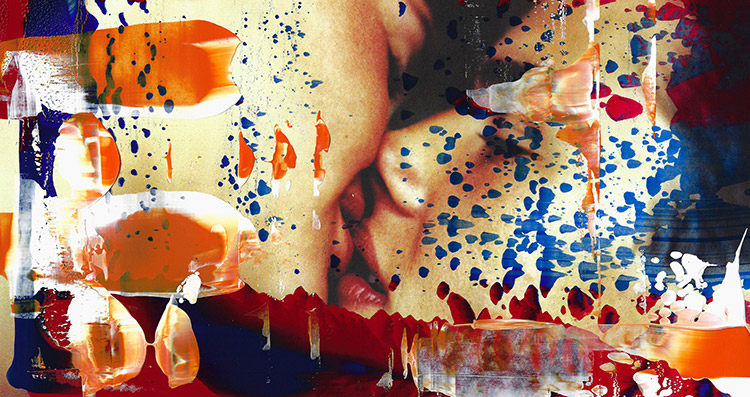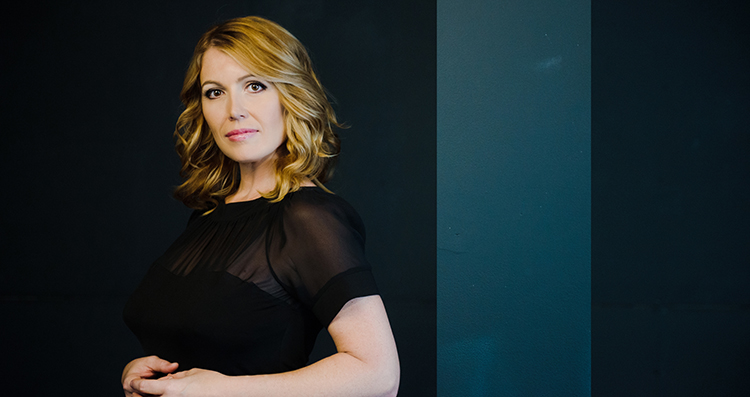The Voice of Vivaldi
Online premiere: December 2, 2021 at 8pm ET
Tafelmusik Baroque Orchestra
with Krisztina Szabó, mezzo-soprano
Program curated and directed by Elisa Citterio
Johann Bernhard Bach
1676–1749
Ouverture in G Major: Ouverture – Gavotte en rondeau – Sarabande – Bourrée – Menuet – Gigue
Johann Sebastian Bach
1685–1750
Aria “Ich esse mit Freuden,” from Cantata 84
* * *
Alessandro Scarlatti
1660–1725
Concerto grosso in F Minor: Grave – Allegro – Largo – Allemande
Antonio Vivaldi
1678–174
Aria “Lo seguitai felice,” from L’Olimpiade, Act III, sc 3
Aria “Non ti lusinghi,” from Tito Manlio, Act II, sc 1
* * *
Tomaso Albinoni
1671–1751
Sonata a cinque in C Major, op. 2 no. 3: Largo – Allegro – Grave – Allegro
Johann Christoph Bach
1642–1703
Lamento “Ach, daß ich Wassers gnug hätte”
* * *
A. Vivaldi
Aria “Sentirò fra ramo,” from L’incoronazione di Dario, Act III, sc 2
Evaristo Felice Dall’Abaco
1673–1742
Concerto in D Major, op. 6, no. 12: Allegro – Grave – Allegro ma non troppo
Tafelmusik Baroque Orchestra
Violin I Elisa Citterio, Emily Eng, Geneviève Gilardeau, Cristina Zacharias
Violin II Christopher Verrette, Elizabeth Loewen Andrews, Michelle Odorico
Viola Patrick G. Jordan, Brandon Chui
Violoncello Keiran Campbell
Double bass Pippa Macmillan
Oboe Marco Cera
Bassoon Dominic Teresi
Lute/Guitar Lucas Harris
Harpsichord/Organ Charlotte Nediger
Krisztina Szabó, mezzo-soprano. Photo by Bo Huang.
Krisztina Szabó, mezzo-soprano
We are delighted to welcome Toronto’s own Krisztina Szabó back to the Tafelmusik stage. This season finds Krisztina singing the roles of Euridice in Gluck’s Orfeo ed Euridice with Vancouver Opera, and Judith in Bartók’s Bluebeard’s Castle for a digital film production with the Canadian Opera Company. She is singing Vivaldi with Early Music Vancouver for a co-production with Ballet BC, and is appearing as soloist with UBC Orchestra singing Chausson’s Poème de l’amour et de la mer, and with Vancouver Bach Choir in Bach’s B-Minor Mass. She returns to Tapestry Opera for S.O.S. Sketch Opera, Episode 3, a digital production, and for R.U.R. A Torrent of Light, a new opera by Nicole Lizee. Krisztina also appears on Analekta’s album New Jewish Music, Volume 3 with Le Nouvel Ensemble Moderne, singing Estro Poetico-harmonico III by the Azrieli Music Prize winner Yotam Haber.
Program Notes
by Charlotte Nediger
In assembling the repertoire for this program, Elisa Citterio looked for music that would celebrate the artistry of Krisztina Szabó. Their first discussions involved a selection of arias from Vivaldi operas. Antonio Vivaldi spent much of his career writing operas, yet we rarely hear that repertoire, especially outside of Italy. All three arias chosen by Elisa and Krisztina are new to Tafelmusik, and are a delight to perform and to hear. The other vocal selections take us to northern Germany and are settings of sacred texts: an joyful chamber aria by Johann Sebastian Bach, and a soulful lament written by his father’s cousin, Johann Christoph Bach. To complete the program, Elisa has chosen a selection of orchestral pieces: an orchestral suite by J.S. Bach’s cousin Johann Bernhard to set the stage for Bach’s chamber aria, and concertos by Alessandro Scarlatti, Albinoni, and dall’Abaco to complement the Vivaldi arias.
From the 16th to the early 19th century, the name Bach was all but synonymous with “musician” in northern Germany: the Bach family tree lists musician after musician, from town fiddlers to distinguished court and church musicians. Our experience of music of the Bach family is centred primarily on Johann Sebastian (J.S.), and occasionally his sons. We are less aware of his numerous cousins, siblings, and forbears, but J.S. himself was keenly aware of his family’s position as bearers of a musical tradition. He compiled the genealogy of the family, and assembled a collection of musical manuscripts of earlier generations known as the Alt-Bachisches Archiv. His library gives us a chance to explore works that otherwise would have been lost, including both Bach family works in this program.
In J.S. Bach’s obituary, Carl Philipp Emmanuel (C.P.E.) names several family members who were particularly admired by his father. Of Johann Bernhard Bach, his father’s cousin and exact contemporary, he notes that he “wrote many fine orchestral suites in the manner of Telemann.” J.S. arranged to have copies of four of these suites made for performances with his Collegium Musicum in Leipzig. Bernhard was employed as town organist and court harpsichordist in Eisenach, replacing his uncle Johann Christoph. We used J.S.’s copy of the G-Major suite to make a performing edition for this concert.
Johann Christoph Bach was a cousin and very close friend of J.S.’s father, and was probably the most influential of the forbears. J.S. himself described him as a “profound composer,” and C.P.E. noted that “he was strong in the invention of beautiful ideas as well as in the expression of the meaning of the words.” Among the works in the Alt-Bachisches Archiv is the remarkable Lamento, a heart wrenching dialogue on grief and remorse between alto singer and solo violin, accompanied by the rich sonority of an ensemble of lower strings.
Nothing could be more contrasting than the delightful aria “Ich esse mit Freuden” from J.S. Bach’s Cantata 84, a solo cantata for soprano. It was first performed in Leipzig on Septuagesima Sunday (the first Sunday of Shrovetide) in February 1727. It is conjectured that he may have written the cantata for his wife, Anna Magdalena, though she wouldn’t have been allowed to perform it in church. The music of the aria is as joyous and uplifting as J.Ch.’s Lamento is tormented and disconsolate. The rollicking introduction played by the solo oboe and violin paints the picture of a pastoral idyll, to which the singer responds in kind.
Antonio Vivaldi devoted most of the second half of his career to the opera theatre, both as composer and impresario. Fellow violinist Giuseppe Tartini apparently claimed, “Vivaldi, who wanted to be active in both fields [vocal and instrumental], always got himself hissed in the first, though he enjoyed great success in the second.” This might reflect a certain amount of jealousy on the part of Tartini, but until quite recently our knowledge of Vivaldi has rested with his instrumental music, suggesting that posterity agreed with Tartini. Vivaldi would have passionately disagreed, and as we gradually uncover his operas and bring them back to the stage, it’s obvious that they are full of riches. Vivaldi himself claimed to have written 94 operas — 45 have been identified and some 20 have survived. We may never know whether Vivaldi’s tally was exaggerated, but we do know that most enjoyed considerable success, and that the music is as vital and imaginative as any of the instrumental music we know and love.
L’Olimpiade is the latest opera represented in this concert, premiering at the Teatro Sant’Angelo in Venice in 1734. The libretto by Pietro Metastasio was written for an opera by Antonio Caldara in 1733, and subsequently set by over 50 other composers. The action opens at the Olympic Games in the ancient city state of Sicyon in Greece. In the aria “Lo seguitai felice” we recognize Vivaldi the concerto composer in the vivacious writing for both the singer and the accompanying strings.Tito Manlio was composed in just five days, intended for a gala performance at the wedding of Vivaldi’s employer, the Governor of Mantua. The wedding was abruptly called off, but the opera was performed during carnival at the Teatro Arciducale in Mantua in 1719. It is a setting of an old libretto by Matteo Noris. The pleading aria “Non ti lusinghi” is a beautiful duet for singer and that most vocal of instruments, the oboe.
L’incoronazione di Dario was premiered at Teatro Sant’Angelo in Venice in 1717. The Vivaldi scholar Michael Talbot suggests that it is “among the most varied and instantly attractive of Vivaldi’s operas,” in part because the libretto (an earlier work by Adriano Morselli) included comic elements and a greater variety of aria texts. The aria “Sentirò fra ramo” is written for a female contralto (the other arias in our concert were written for castrati), and the accompanying strings, including solo violin and cello, set a delightful scene of gentle breezes and birdsong.
At the core of the orchestral repertoire in baroque Italy is a vast quantity of concertos and sonatas written for string ensembles, and it is to a selection of these that we turn to round out the concert. If Vivaldi is best known as an instrumental composer, the opposite is true of the Neapolitan composer Alessandro Scarlatti, who produced a steady stream of operas for forty years, as well as countless cantatas. Much less well known are his two dozen concertos, six of which were published in London fifteen years after his death. It is in this collection that we find the Concerto in F Minor, a key associated with laments and funeral music. (Locatelli’s Sinfonia funebre in F Minor was featured in Tafelmusik’s Passions of the Soul last season.)
The Venetian composer Tomaso Albinoni was the son of a well-to-do paper merchant and manufacturer of playing cards, and throughout his career he expressed appreciation of his enviable position. He considered himself a “dilettante” — his independent means leaving him free to delight himself and others through music. His worklist is impressively long: some 80 operas, 50 cantatas, 100 sonatas, 59 concertos, and 8 sinfonias. He clearly found much delight in composing! A curiosity of Albinoni’s biography is that his most renowned piece, the so-called “Albinoni Adagio,” was in fact composed by the 20th-century musicologist and critic Remo Giazotto, one of Albinoni’s biographers.
The Veronese composer Evaristo Felice Dall’Abaco spent some time in Modena before heading north to join Maximilian II’s court in Munich as a cellist. The elector was a generous patron of the arts, and Dall’Abaco remained with him as military defeats took the court to the Netherlands and France, and finally to a successful return to Munich. His output as a composer is evidenced in six carefully prepared publications of instrumental sonatas and concertos. There is a hint of his court travels in his music, but the vitality of his writing is distinctly Italian.
Thank You to our Generous Donors
Tafelmusik is deeply grateful to our generous donors who have continued to support us through this challenging time. Your support has inspired us to remain strong and to deliver joy to our community through our music, and will enable us to persevere until we can once again perform live for you, our cherished patrons. Thank you for believing in Tafelmusik and in the power and beauty of music.
If you would like to make a gift, please click here or contact us at donations@tafelmusik.org.
2021/22 Season Presenting Sponsor
Thank you to our government sponsors







